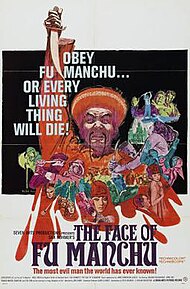The Face of Fu Manchu
| The Face of Fu Manchu | |
|---|---|

Theatrical release poster
|
|
| Directed by | Don Sharp |
| Produced by |
Harry Alan Towers Oliver A. Unger |
| Written by | Harry Alan Towers |
| Starring |
Christopher Lee Nigel Green Howard Marion-Crawford Tsai Chin |
| Music by | Christopher Whelen |
| Cinematography | Ernest W. Steward Ernie Stewart |
| Edited by | John Trumper |
|
Production
company |
Hallam Productions (UK)
Constantin Film (W. Germany) |
| Distributed by | Seven Arts |
|
Release date
|
6 August 1965 |
|
Running time
|
96 min. |
| Country | United Kingdom West Germany |
| Language | English |
| Box office | $1,300,000 |
The Face of Fu Manchu is a 1965 British/German co-production thriller based on the character of Fu Manchu, the Chinese villain created by Sax Rohmer. Don Sharp directed, with Christopher Lee as Fu Manchu and Nigel Green as Nayland Smith, the Scotland Yard detective in his pursuit.
It was produced by Harry Alan Towers in a co-production for Hallam Films and Constantin Film and was filmed on location in Dublin, Republic of Ireland. The film was the first in a series of five, the next of which was The Brides of Fu Manchu.
A ghostly execution of world mastermind criminal Fu Manchu is witnessed by nemesis Nayland Smith. Back in England, however, it is increasingly apparent that Fu Manchu is still operating. Smith is quick to detect that the execution he witnessed was that of a double, an actor hypnotised into taking Fu Manchu's place. The villain is back in London, working from a secret base underneath the River Thames. He has kidnapped the esteemed Professor Muller, who holds the key to a potentially deadly solution from the seeds of a rare Tibetan flower.
Producer Harry Alan Towers denied the films were made to cash in on the James Bond craze:
No relationship. Action, adventure, open-air, escapism - yes - but nothing to do with Bond-ism - Fu Manchu's atmosphere is a kind of timeless Never Never land. Bond is gimmicky and with-it.
The film was shot on location in Ireland. Towers:
It's a good country for location work; the British quota helps; on costs, there is not much difference between making a film here and in Britain - both sets of unions see to that. Ardmore? It seems to be doing alright with the present film - and Ireland will always be attractive as long as filmmakers and their artists are seeking refuge from super tax.
...
Wikipedia
